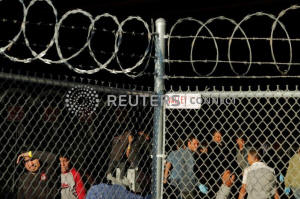|
Trump cuts aid to Central American
countries as migrant crisis deepens
 Send a link to a friend
Send a link to a friend
 [April 01, 2019]
By Julia Harte and Tim Reid [April 01, 2019]
By Julia Harte and Tim Reid
WASHINGTON/EL PASO, Texas (Reuters) - The
U.S. government cut aid to El Salvador, Guatemala and Honduras on
Saturday after President Donald Trump blasted the Central American
countries for sending migrants to the United States and threatened to
shutter the U.S.-Mexico border.
A surge of asylum seekers from the three countries have sought to enter
the United States across the southern border in recent days. On Friday,
Trump accused the nations of having "set up" migrant caravans and sent
them north.
Trump said there was a "very good likelihood" he would close the border
this week if Mexico did not stop immigrants from reaching the United
States. Frequent crossers of the border, including workers and students,
worried about the disruption to their lives the president's threatened
shutdown could cause.
At a rally on the border in El Paso, Texas, Democratic presidential
hopeful Beto O'Rourke denounced Trump's immigration policies as the
politics of "fear and division."

A State Department spokesman said in a statement it was carrying out
Trump's directive by ending aid programs to the three Central American
nations, known as the Northern Triangle.
The department said it would "engage Congress in the process," an
apparent acknowledgement that it will need lawmakers' approval to end
funding that a Congressional aide estimated would total about $700
million.
New Jersey Senator Bob Menendez, the top Democrat on the Senate Foreign
Relations Committee, called Trump's order a "reckless announcement" and
urged Democrats and Republicans alike to reject it.
Trump told reporters at his Mar-a-Lago resort in Florida on Friday that
the United States was paying the three countries "tremendous amounts of
money," but received nothing in return.
Mario Garcia, a 45-year-old bricklayer in El Salvador, said he was
setting off for the United States regardless of the president's threat
to close the frontier.
"There is no work here and we want to improve (our lives), to get ahead
for our families, for our children. I don't give a damn (what Trump
says), I'm determined," Garcia said.
Garcia was one of a group of at least 90 people who left the capital San
Salvador over the weekend on buses heading north, in what locals said
was the tenth so-called caravan to depart for the United States since
October.
The government of El Salvador has said it has tried to stem the flow of
migrants.

The Honduran Foreign Ministry on Saturday called the U.S. policies
"contradictory" but stressed that its relationship with the United
States was "solid, close and positive."
Trump, who launched his presidential campaign in 2015 with a promise to
build a border wall and crack down on illegal immigration, has
repeatedly threatened to close the frontier during his two years in
office but has not followed through.
[to top of second column]
|

Migrants from Central America are seen inside an enclosure, where
they are being held by U.S. Customs and Border Protection (CBP),
after crossing the border between Mexico and the United States
illegally and turning themselves in to request asylum, in El Paso,
Texas, U.S., March 29, 2019. REUTERS/Lucas Jackson

This time, Homeland Security Secretary Kirstjen Nielsen and other
U.S. officials say border patrol officers have been overwhelmed by a
sharp increase asylum seekers, many of them children and families
who arrive in groups, fleeing violence and economic hardship in the
Northern Triangle.
March is on track for 100,000 border apprehensions, Homeland
Security officials said, which would be the highest monthly number
in more than a decade. Most of those people can remain in the United
States while their asylum claims are processed, which can take years
because of ballooning immigration court backlogs.
Nielsen warned Congress on Thursday that the government faces a
"system-wide meltdown" as it tries to care for more than 1,200
unaccompanied children and 6,600 migrant families in its custody.
Trump has so far been unable to convince Congress to tighten asylum
laws or fund his border wall. He has declared a national emergency
to justify redirecting money earmarked for the military to pay for
the wall.
Mexico has played down the possibility of a border shutdown. Its
foreign minister, Marcelo Ebrard, said the country is a good
neighbor and does not act on the basis of threats.

It was not clear how shutting down ports of entry would deter asylum
seekers because they are legally able to request help as soon as
they set foot on U.S. soil.
But a border shutdown would disrupt tourism and U.S.-Mexico trade
that totaled $612 billion last year, according to the U.S. Census
Bureau. A shutdown could lead to factory closures on both sides of
the border, industry officials say, because the automobiles and
medical sectors especially have woven international supply chains
into their business models.
(Reporting by Julia Harte and Richard Cowan in Washington, and Tim
Reid in El Paso; Additional reporting by Jose Luis Gonzalez in
Ciudad Juarez, Julia Love in Mexico City, Omar Younis in San Diego,
Nelson Renteria in San Salvador and Orfa Mejia in Tegucigalpa;
Writing by Daniel Wallis; Editing by Rosalba O'Brien)
[© 2019 Thomson Reuters. All rights
reserved.]
Copyright 2019 Reuters. All rights reserved. This material may not be published,
broadcast, rewritten or redistributed.
Thompson Reuters is solely responsible for this content. |